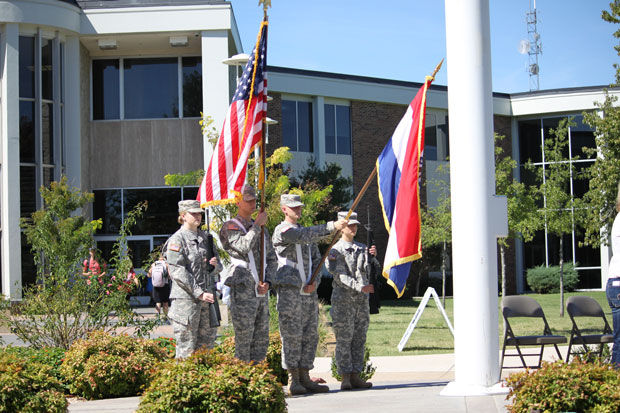Campus counseling services help veterans adjust
Students from the Show-Me Gold Officer Training Program partake in the Veterans Challenge held Sept. 22 on the Oval. Coordinated by the Missouri Southern Student Veterans Organization, the challenge seeks to raise awareness for the growing number of veteran suicides across the country.
When returning home from war, some soldiers have difficulties coping with their everyday lives.
Since 2001, Missouri has deployed its share of service members. In an article titled “Missouri National Guard remembers members’ service,” Maj. Gen. Stephen L. Danner wrote, “We’ve deployed more than 11,000 soldiers and airmen to overseas contingency operations, while at the same time meeting our domestic mission through supporting missions like Hurricane Katrina and the Joplin tornado.”
A survey by the Iraq and Afghanistan Veterans of America showed that 30 percent of service members have considered taking their own life, and 45 percent said they know and Iraq or Afghanistan veteran who has attempted suicide.
In an interview with CNN, Iraq war veteran Brian Kinsella said, “There’s probably a tidal wave of suicides coming.” Kinsella started Stop Soldier Suicide, a nonprofit group that works to raise awareness of suicide. Between October 2006 and June 2013, the Veterans Crisis Line received more than 890,000 calls.
President Obama said in a statement there is a need to “end this epidemic of suicide among our veterans and troops.”
According to the Department of Veterans Affairs, every day 22 veterans take their own lives. Why would seemingly normal young men and women choose suicide? Soldiers do receive suicide awareness briefings when returning home, however, one local veteran doesn’t believe the briefings are beneficial.
“Their approach was not one of concern but of ‘checking the box’,” said Tim Bridges, Carthage. Bridges, now a deputy sheriff with Jasper County, is a veteran of Operation Iraqi Freedom. “The military needs to prepare people to adjust to peace as much as they adjust for war,” Bridges explained.
Military leadership does encourage soldiers to seek mental health services, but not with definite follow-through.
“Mostly they seem to not want to have to deal with the problems that arise when this happens. Good leaders really care about their troops and pay attention…even outside of the army,” said James Loebig, Thayer, Mo. Loebig is also a veteran of Operation Iraq Freedom.
“Get all of the politics out of the picture and help us all. There should never be any instance of a soldier not getting the help…because he got…lost in the system,” he said.
Missouri Southern has an on-campus counseling service in the Academic, Counseling and Testing Services (ACTS) office. Heather Bullock, clinical counselor/academic advisor, says Southern has trained staff on campus to help.
“There are three licensed professional counselors in the ACTS office to provide mental health services,” Bullock said. Even if a student is in crisis after hours, there is a partnership for that.
“We have a partnership with Ozark Center Crisis Line. If a student needs help, we can get the resources on campus or have the student transported,” Bullock said.
Bullock also believes suicide is an issue.
“It is an issue, she said, “especially in military, LBGT and those with low socio-economic status.” “Lack of services,” is one reason why the veteran suicide rate is so high, she said.
Service members and their families are encouraged to contact the Veterans Crisis Line at 800-273-8255 if they need immediate mental health assistance or to find resources in their local areas.
Your donation will support the student journalists of Missouri Southern State University. Your contribution will allow us to purchase equipment and cover our annual website hosting costs.




























